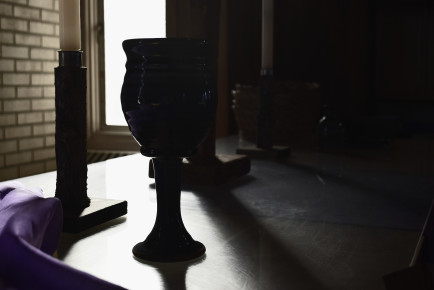You have no items in your cart. Want to get some nice things?
Go shopping

The first time I receive Communion, I am seven years old. I have been coached. You hold out your hands—right over left—or you stick out your tongue and let the priest place the Host there when he gives the blessing. I hold out my hands because it seems the more polite thing to do.
I put the wafer in my mouth and let it rest on my tongue as I make my way back to my seat. By the time I sit back down in the pew the Host is soggy, half-dissolved. I flip the kneeler down and bow my head. The little trapdoor inside my heart rings with excitement, but also with worry. I am one of God’s own now, completely.
I feel entirely different.
I don’t feel different at all.
The Host is supposed to stay on your tongue until the priest is finished distributing to everyone in the congregation. You’re not supposed to chew it. I don’t, but my wafer disappears long before the rest of the church is fed. The shape of it stays on my tongue like some kind of unleavened memory.
*
Emily has blue eyes, and hair that changes with the weather. Hair that used to be blonde, or almost-blonde, or something-that-is-light-enough-to-pass-for-blonde. At some point halfway through her twenties, she’ll get a haircut and the stylist will point out her true colour on a box and it will say brown and she’ll be astonished.
She is honey-blonde and then dark, pink and then tufted with green. The year that she turns thirty-one, she’ll go for blue.
When we meet, during my first year of university, her hair is long and parted down the middle. She looks about fifteen. She is in love with a boy in our writing class, a boy with brown hair and glasses who will go on to be an engineer.
We’ll walk around each other for the first two years, and then one day I’ll sit beside her as we both wait for class and she’ll start talking.
“My dad died,” she’ll say. She is not with the engineer anymore and her hair is much shorter. “Two years ago. It’s been a rough climb back up.”
The trapdoor will shuddersqueak open. Come in, I’ll want to say. Come in, and tell me stories.
*
When I am thirteen, my dad and mum and aunt and I all drive down to the city cathedral for my confirmation.
“City parking,” my dad says. “They fucking screw you, no matter what.”
Inside the cathedral, the air is hushed and soft and everything is draped in red and purple—the pews, the windows, the altar. The Bishop wears a tall red hat and carries a staff and when I step in front of him there’s a rush of holiness so strong I want to cry. He has deep dark eyes and a strong nose. He was Italian, but he isn’t really anymore because now he is of God.
He smiles. He makes the sign of the cross on my forehead.
I am one of God’s own now, completely.
I feel differently.
I don’t feel differently at all.
We stay for the service and then find our car and drive home. My father talks about the man who oversees our church operations now. He’s trying for a seat in the upcoming elections.
“Won’t vote for him,” my dad says. “He’s a pompous ass.”
My aunt laughs. “What a thing to say, today of all days.”
I laugh too, a little. But mostly I’m trying not to be ashamed that while I was standing in front of the bishop and praying I was also thinking about Jeremy, who’s in my class and who I would like to be my boyfriend even though that’s never ever going to happen. I asked God for him. The trapdoor in my heart hides lots of things.
*
“Why isn’t a woman on the list of people to be Pope?”
Emily asks me this one day in university, when we’re on the city bus to class. John Paul II has died and the Papal Conclave is in full swing.
“Well,” I say, “they take the candidates from bishops. Bishops are all former priests. And women can’t be priests, so. That’s why.”
“You’re serious?”
“Well, yeah.”
She looks at me, shakes her head. “I don’t understand how you can do it, then.”
“Do what?”
“Be a part of something that excludes you on such a fundamental level.”
“Oh,” I say. I’ve never thought about it that way. “Well, it’s not like I ever wanted to be a priest anyway.”
*
Years later I’ll see the bishop walking down the street in my hometown. He’s retired now. I didn’t realize that bishops could retire. That these men could put away their robes and spend their wintry years drinking Scotch and watching bad television, that they could long for a Christmas that might contain something else other than Mass.
Some time after this he’ll come in to the Catholic hospital where I work and people will part for him just like the Red Sea I don’t believe in anymore. He’s come for routine bloodwork, because holy men need doctors too. He smiles at me, but doesn’t remember my name. I’m not surprised.
My hospital does not do rape kits. This bothers me but not enough to make me quit. There are principles, and then there are bills to pay.
*
Emily does not believe in God. She doesn’t really believe in people, either, though I think she would like to, though I think at times she longs, like me, for magic. I stop asking God for things whenever she’s around. I believe. I don’t believe. I am no longer entirely one of God’s own.
One summer when I am housesitting she comes to stay with me, and we pretend that we are roommates. We live in a yellow house in Victoria that sits half a block from the beach. We stay up late watching movies and make breakfast in the house’s open-plan kitchen, walk the dog, read each other’s stories. Sometimes her boyfriend, Paul, comes to visit. Sometimes they fight, and he stays away.
“We should be roommates for real,” she says, and so we look at houses.
I like bright apartments that have wooden floors, and houses that are located in the nicer parts of town. Emily shakes her head.
“They’re too expensive,” she says. “Maybe this isn’t such a good idea.”
Around her I feel sheltered, somehow lacking. The world is a rough place but I’ve missed most of the blows. As though the countless Hosts I’ve swallowed have dissolved into some kind of force-field—God on one side, the rest of the world on the other. Imaginary ghosts that whisper in your ear.
You are one of God’s own now, they say. You are protected. No matter what.
*
When I am twenty-nine, the priest who served in the diocese during my childhood goes to jail for sexual assault. The incidents—there were two—happened years ago, when he was a priest in a neighbouring city.
“I can’t help it,” my mother says. “I’m trying to understand and I just can’t.”
My sister, who had imagined him at her wedding, cries. I do not cry at all. Instead I think about this priest, much older now than in my memories, pleading guilty to a thirty-year-old mistake. The trapdoors that lie down deep inside our secret hearts. The hurts we do not mean. The strengths that even God cannot teach us.
*
When Emily comes to visit me in my new apartment she brings movies and cigarettes and I make dinner. She is not dating Paul anymore. She’s been to the movies with a boy named AJ, though, so maybe he is Boyfriend Next. We don’t know. Not yet.
“I think there’s a power out there,” she says. “I talked about it with Paul. Something out there in the universe. I wouldn’t call it God, though. I don’t know what it is.”
“Well,” I say. “That’s something, isn’t it.”
“Sure,” she says. “It’s still not fair about female priests, though. I’ll never understand that.”
I want to say that I don’t understand it either, that I am sad but also tired, that I have nowhere else to go. Instead I pull her face toward my own and kiss her lips, so soft.
She murmurs, surprised. A little squeak. She doesn’t pull away. Her hands around my waist are soft and sure, gathering the folds of my sweater the way that I imagine God must have gathered people from the desert all those years ago. None of the men that I kiss in future years will feel like this.
It’s okay, the hands say. Don’t be afraid. I know what I am doing.
About Amanda Leduc
I am a Canadian writer whose essays and stories have appeared in publications across Canada, the US, the UK, and Australia. My novel, THE MIRACLES OF ORDINARY MEN, was published in North America in 2013 by Toronto's ECW Press.



